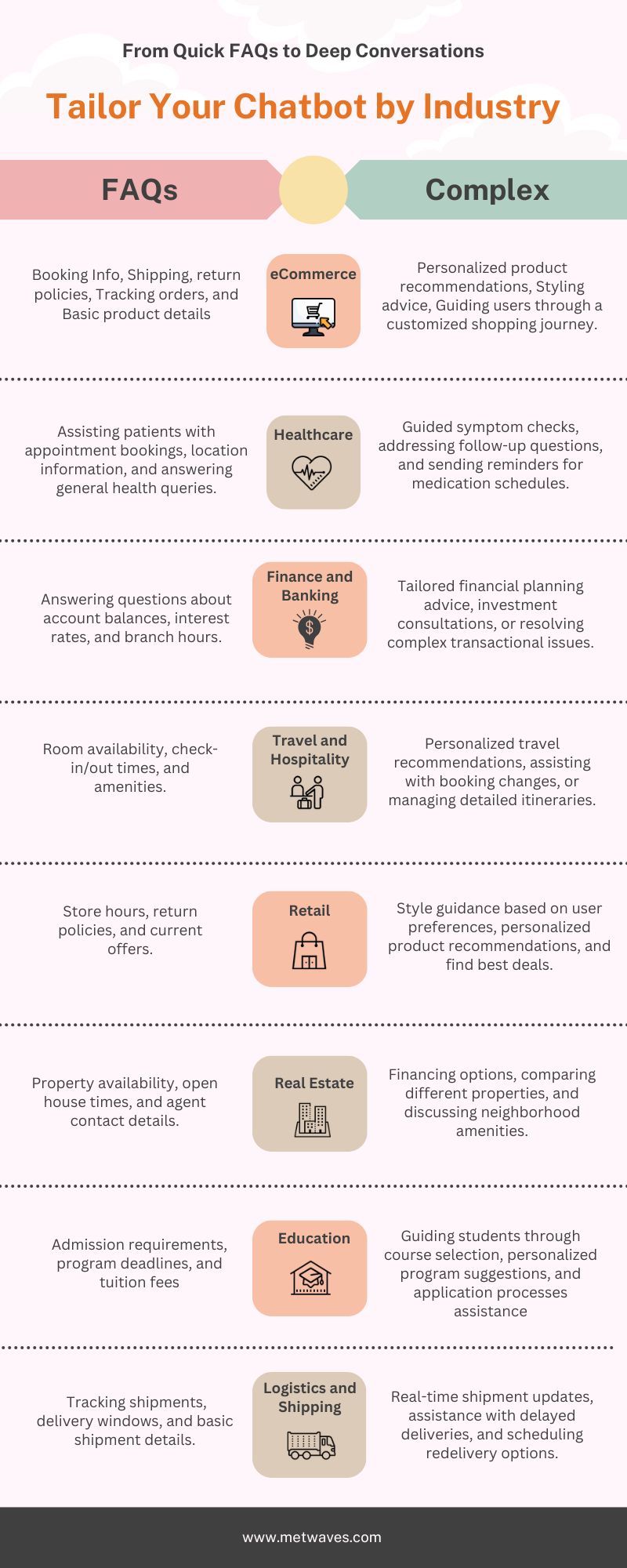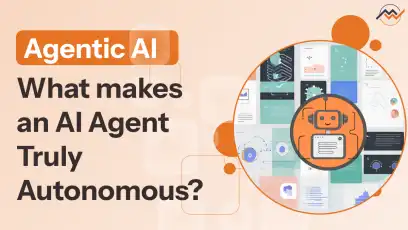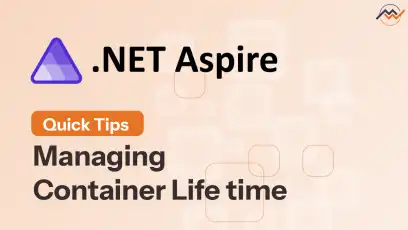Different industries have their unique challenges and customer expectations, which play a big role in deciding the kind of chatbot to implement. For instance, a restaurant might need a simple bot to handle reservations and menu inquiries, while a financial institution may require a more sophisticated chatbot to guide customers through their investments and financial planning. These virtual assistants can save time and streamline communication, but choosing the right level of conversation can be tricky. Should a business use a simple chatbot that answers basic questions, or should it opt for a more complex system that can handle detailed conversations? The answer often depends on the specific needs of each industry.
This article dives deep into how various industries can assess their needs and decide on the best approach to chatbot functionality. By carefully considering whether to go for simple FAQ-style responses or deeper, more interactive conversations, businesses can ensure they deliver the best possible experience for their customers.

Choosing the Right Balance:
In the bustling world of e-commerce, efficiency is paramount. Customers often have urgent questions regarding shipping, returns, and payment options. For these straightforward queries, a simple FAQ chatbot can provide immediate answers, improving customer satisfaction and reducing wait times. However, as e-commerce becomes increasingly competitive, businesses are recognizing the importance of personalized shopping experiences. Here, chatbots with more complex capabilities—such as understanding user preferences and providing tailored recommendations—become invaluable.
Example Tasks:
FAQ-Focused: Answering common inquiries about return policies, tracking orders, and basic product details.
Complex Conversations: Offering personalized product recommendations based on browsing history, providing styling advice, or guiding users through a customized shopping journey.
Conclusion for E-commerce: While simple FAQs serve as the backbone of customer service, incorporating depth can significantly enhance the shopping experience, replicating the in-store feel and ultimately driving sales.
In the healthcare sector, chatbots must navigate the delicate balance between accessibility and privacy. Simple FAQ bots are effective for managing appointment scheduling and answering general health-related questions. However, as healthcare becomes more patient-centered, there is a growing demand for chatbots that can provide personalized medical information while adhering to strict privacy regulations.
Example Tasks:
FAQ-Focused: Assisting patients with appointment bookings, location information, and answering general health queries.
Complex Conversations: Conducting guided symptom checks, addressing follow-up questions, and sending reminders for medication schedules.
Conclusion for Healthcare: While simplicity offers safety and efficiency, strategically implementing deeper conversations can improve patient engagement and adherence to treatment plans.
Choosing the Right Balance:
In finance and banking, trust is a cornerstone of customer relationships. Simple FAQ chatbots can efficiently handle routine inquiries, such as checking account balances or finding branch locations. However, when it comes to sensitive matters like financial advice or investment options, customers seek personalized interactions that convey understanding and empathy.
Example Tasks:
FAQ-Focused: Answering questions about account balances, interest rates, and branch hours.
Complex Conversations: Providing tailored financial planning advice, investment consultations, or resolving complex transactional issues.
Conclusion for Finance: While simple interactions streamline everyday banking tasks, incorporating depth into chatbots fosters trust and builds long-term customer relationships, especially for sensitive financial matters.
Choosing the Right Balance:
The travel and hospitality sectors thrive on customer satisfaction, making chatbot functionality vital for enhancing guest experiences. Basic FAQ chatbots can provide quick information on check-in policies, room availability, and amenities. However, as travelers increasingly seek personalized experiences, chatbots that can offer tailored recommendations and assist with bookings become essential.
Example Tasks:
FAQ-Focused: Providing information about room availability, check-in/out times, and amenities.
Complex Conversations: Offering personalized travel recommendations, assisting with booking changes, or managing detailed itineraries.
Conclusion for Travel: Deep, engaging conversations can significantly enhance the guest experience by providing customized interactions, while simple FAQs ensure quick resolutions to common questions.
Choosing the Right Balance:
In retail, chatbots often begin by answering straightforward inquiries about store hours, return policies, and ongoing promotions. However, as online shopping evolves, the potential for chatbots to enhance the shopping experience through complex interactions becomes apparent. Retailers can leverage chatbots to offer styling advice, product comparisons, and upselling opportunities.
Example Tasks:
FAQ-Focused: Providing information on store hours, return policies, and current offers.
Complex Conversations: Offering style guidance based on user preferences, personalized product recommendations, and helping shoppers find the best deals.
Conclusion for Retail: Complex conversations in retail chatbots can replicate the personalized experience of shopping in a physical store, enhancing customer satisfaction and increasing conversion rates.
Choosing the Right Balance:
In the real estate industry, where decisions can be financially and emotionally significant, chatbots play a crucial role in guiding potential buyers. Simple FAQ bots can help users find property availability or open house schedules, while more detailed conversations can assist serious buyers in navigating financing options and neighborhood comparisons.
Example Tasks:
FAQ-Focused: Answering questions about property availability, open house times, and agent contact details.
Complex Conversations: Providing in-depth information about financing options, comparing different properties, and discussing neighborhood amenities.
Conclusion for Real Estate: While simple inquiries are essential for initial engagement, complex interactions are critical for guiding prospective buyers through their decision-making process.
Choosing the Right Balance:
Educational institutions can benefit significantly from chatbot technology. Basic FAQs can effectively address common admissions questions, course offerings, and deadlines. However, for prospective students looking for more personalized guidance, chatbots that can provide tailored program recommendations and application assistance can significantly enhance the enrollment experience.
Example Tasks:
FAQ-Focused: Answering questions about admission requirements, program deadlines, and tuition fees.
Complex Conversations: Guiding students through course selection, providing personalized program suggestions, and assisting with application processes.
Conclusion for Education: While simple FAQ bots are effective for initial inquiries, incorporating depth can enhance student onboarding and overall satisfaction, ultimately leading to higher enrollment rates.
Choosing the Right Balance:
In logistics and shipping, customer convenience is paramount. Basic FAQs addressing tracking inquiries and delivery estimates are critical for keeping customers informed. However, more complex interactions are essential for handling issues such as delayed deliveries, loss claims, and rescheduling options.
Example Tasks:
FAQ-Focused: Answering questions about tracking shipments, delivery windows, and basic shipment details.
Complex Conversations: Offering real-time shipment updates, assistance with delayed deliveries, and scheduling redelivery options.
Conclusion for Logistics: Simple chatbots are effective for handling routine inquiries, while more in-depth conversations become invaluable for addressing complex issues in real time, ensuring customer satisfaction.
Conclusion: Matching Chatbot Scope to Industry Needs
As businesses weigh the options between simplicity and depth in chatbot design, it's essential to analyze their specific industry needs, customer expectations, and the types of inquiries they receive. For high-frequency, straightforward inquiries, simple FAQs offer quick, efficient solutions. However, when personalization, customer engagement, or retention is at stake, investing in more sophisticated chatbot systems can yield significant benefits.
Metwaves is here to help clients navigate this process by building chatbots tailored to their unique business needs. We understand that every organization is different, which is why we recommend starting with a simple, effective chatbot solution. This approach allows businesses to address immediate customer inquiries while collecting valuable feedback. As client needs evolve, we can gradually enhance the chatbot’s capabilities, adding more complex interactions and personalized features over time. This flexibility ensures that our clients can adapt to changing demands without overwhelming their customers or their resources.




